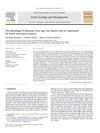 5 citations,
June 2004 in “The Journal of The British Menopause Society”
5 citations,
June 2004 in “The Journal of The British Menopause Society” Testosterone therapy can improve sexual satisfaction and mood in surgically menopausal women when used with estrogen, but its long-term safety and effects on naturally menopausal and premenopausal women are unclear.
 5 citations,
January 2016 in “Journal of The American Academy of Dermatology”
5 citations,
January 2016 in “Journal of The American Academy of Dermatology” Skin doctors should know about skin and kidney disease links to prevent serious kidney problems.
[object Object]  May 2021 in “Dermatopathology”
May 2021 in “Dermatopathology” The review emphasizes the need to recognize skin conditions that affect hair follicles and sweat glands to avoid misdiagnosis.
 14 citations,
January 2008 in “Gynecological Endocrinology”
14 citations,
January 2008 in “Gynecological Endocrinology” High levels of male hormones in women without tumors are linked to metabolic problems and can be treated with metformin.
 90 citations,
December 2007 in “Current Oncology”
90 citations,
December 2007 in “Current Oncology” Non-hormonal treatments should be used first for sexual dysfunction in postmenopausal breast cancer patients on aromatase inhibitors, with hormones as a second option.
 March 2007 in “The FASEB Journal”
March 2007 in “The FASEB Journal” Henna mixed with PPD can cause skin reactions, scarring, and a specific type of baldness, and needs more research to understand these effects.
 24 citations,
April 2007 in “European Journal of Pharmaceutics and Biopharmaceutics”
24 citations,
April 2007 in “European Journal of Pharmaceutics and Biopharmaceutics” Microparticles containing artocarpin extract could effectively treat hair loss and acne with minimal side effects.
 81 citations,
May 2007 in “Fertility and Sterility”
81 citations,
May 2007 in “Fertility and Sterility” Testosterone therapy seems safe for postmenopausal women for a few years, but more research is needed for long-term effects.
 282 citations,
October 2006 in “The Journal of Clinical Endocrinology and Metabolism”
282 citations,
October 2006 in “The Journal of Clinical Endocrinology and Metabolism” The Endocrine Society advised against routine testosterone therapy for women, citing a need for more research on long-term safety and a clear definition of androgen deficiency.
 295 citations,
September 2006 in “Cell Cycle”
295 citations,
September 2006 in “Cell Cycle” The conclusion is that using drugs to block the TOR pathway might slow aging and prevent age-related diseases.

A thorough skin history and examination are essential for diagnosing and treating skin conditions effectively.
 1 citations,
June 2013 in “Medicine”
1 citations,
June 2013 in “Medicine” A thorough skin history and full examination are important for diagnosing and understanding the impact of skin diseases.
 2 citations,
March 2004 in “Reviews in Gynaecological Practice”
2 citations,
March 2004 in “Reviews in Gynaecological Practice” Hormonal changes and psychological issues can cause sexual dysfunction in postmenopausal women. Behavioral therapy is recommended first, with hormone replacement helping some symptoms but not libido. Testosterone can improve libido, but its effects on overall sexual function are unclear. Emotional and relationship issues should be addressed before using medication, and the benefits and risks of testosterone supplementation should be considered.
 46 citations,
August 2016 in “Journal of The American Academy of Dermatology”
46 citations,
August 2016 in “Journal of The American Academy of Dermatology” The study found that family history, personal history of adolescent acne, no pregnancies, hirsutism, office work, stress, and low intake of fruits/vegetables and fish are risk factors for adult female acne.
 1 citations,
January 2017 in “Social Science Research Network”
1 citations,
January 2017 in “Social Science Research Network” The document suggests creating a secure database for indigenous knowledge and recommends that the TKDL actively fight patents that slightly alter traditional knowledge.
 40 citations,
November 2016 in “Molecules”
40 citations,
November 2016 in “Molecules” Some plants used in traditional medicine may help treat cancer because they contain proteins that can inactivate ribosomes.
 9 citations,
September 2016 in “Medical Clinics of North America”
9 citations,
September 2016 in “Medical Clinics of North America” Eating less and exercising more, with personalized diet plans and realistic goals, can lead to weight loss and better health, but more research is needed for long-term success.
 4 citations,
March 2013 in “Neuropsychiatric Disease and Treatment”
4 citations,
March 2013 in “Neuropsychiatric Disease and Treatment” A woman with anorexia and Cushing's syndrome improved after tumor removal, highlighting the need to consider hormonal issues in psychiatric conditions.
[object Object]  23 citations,
January 2001 in “Chemical & Pharmaceutical Bulletin”
23 citations,
January 2001 in “Chemical & Pharmaceutical Bulletin” New pregnane derivatives are effective at inhibiting an enzyme linked to hair loss and reducing oil gland activity.
 30 citations,
March 2001 in “Environmental Health Perspectives”
30 citations,
March 2001 in “Environmental Health Perspectives” Small changes in hormones can significantly impact health, showing the importance of sensitive testing for chemicals that disrupt hormones.
 19 citations,
June 1999 in “Steroids”
19 citations,
June 1999 in “Steroids” Different halogens on progesterone derivatives can either block or mimic male hormone effects, depending on their type and amount.
 4 citations,
December 2020 in “International journal of research - granthaalayah”
4 citations,
December 2020 in “International journal of research - granthaalayah” Tetracycline can stick to hair follicles and potentially cause hair loss.
 January 2022 in “Function”
January 2022 in “Function” Studying rare genetic disorders can help us understand and treat common diseases better.
 2 citations,
November 2018 in “Indian Journal of Pharmaceutical Education”
2 citations,
November 2018 in “Indian Journal of Pharmaceutical Education” The developed model can predict effective 5-alpha-reductase enzyme inhibitors.
 1 citations,
August 2023 in “Indian Journal of Plastic Surgery/Indian journal of plastic surgery”
1 citations,
August 2023 in “Indian Journal of Plastic Surgery/Indian journal of plastic surgery” The Indian Journal of Plastic Surgery has achieved a Journal Impact Factor of 0.8 and improved its Scopus CiteScore to 1.4.
 40 citations,
December 2012 in “Epilepsia”
40 citations,
December 2012 in “Epilepsia” Neurosteroids change how GABA_A receptors work in the brain, which could be important for treating temporal lobe epilepsy.
218 citations,
September 2012 in “Gastroenterology” Colorectal cancer development involves both genetic changes and epigenetic alterations like DNA methylation and microRNA changes.
 13 citations,
September 2012 in “Critical Reviews in Food Science and Nutrition”
13 citations,
September 2012 in “Critical Reviews in Food Science and Nutrition” Wheat straw is valuable for its health benefits and various industrial uses.
March 2024 in “Veterinary sciences” Geriatric Julia Creek dunnarts often suffer from reproductive and skin diseases, impacting conservation efforts.
 46 citations,
November 2011 in “Forest Ecology and Management”
46 citations,
November 2011 in “Forest Ecology and Management” Understanding the fruiting patterns of Ficus trees can improve forest restoration by ensuring pollinators survive and biodiversity is supported.



























